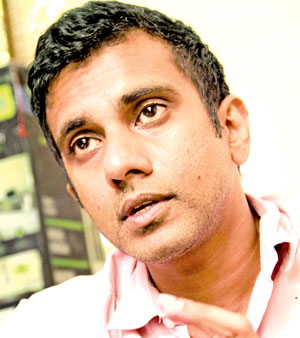
Lahiru Pathmalal, a member of the trio that founded one of the country´s pioneering e-commerce websites, Takas.lk in 2012, is a highly successful young entrepreneur today. The business at the time was the only one of its kind in Sri Lanka. Having studied Psychology and Political Science, and somewhat, a jack of all trades, for Lahiru it was the need for a change in career that led him down the unlikely path of e-commerce. Hard work and dedication has converted Takas.lk into a business that sees the sale of goods worth US $ 200,000 on average every month.
Q: How would you describe Takas as a business and how did you get this business idea?
A: Takas is purely an e-commerce company. We have no store front, showrooms or even a store sign as many other similar companies have. All business transactions happen primarily online. It was Takas that took the first step by setting up a pure e-commerce company in Sri Lanka.

Pictures by Dushmantha Mayadunne
Lahiru Pathmalal
|
When I was living abroad, I once wanted to purchase a television set online for my parents in Sri Lanka only to find out that there was no such service available.
I felt that there could be many other consumers interested in purchasing electronic goods and other similar items online so this realization led me to come up with the idea to launch Takas.
Q: What is the story behind the name of your business?
A: We had a number of names lined up. One was ´Tuktuk´ and also ´Taktak´ but many people felt it would be confused as a taxi service. So in our search of a catchy name finally it was Rajiv Weerasinghe, the Executive Creative Director of Heensare who came up with the winning name ´Takas´.
Q: What drove you to start your own business rather than joining the well-established family business?
A: My parents, Sarath and Priyani Pathmalal founded Gigi shoes Pvt Ltd. But, anybody who is part of a family business will tell you that joining the family business in not easy. It has its own pros and cons. However, I wanted to do my own thing and find an idea that I can go forward with.
Q: Could you elaborate on the process of launching a start-up?
A: Today there are a lot of resources for start-ups. Elements such as funding, mentorship as well as network are important and while these are readily available one must know where to go in search of these resources. As luck would have it, my fellow co-founders had prior experience in starting a business so the process was somewhat easy and I was able to rely on their expertise.
Q: What were the main difficulties you faced at the inception?
A: At the start there are less difficulties as one’s expectations are different, but in fact, it is when the business expands that difficulties tend to grow. In Sri Lanka, the main difficulties for start-ups are the various regulations. There is so much red tape.
The other main issue faced by us was that being a retail business we needed large amounts of funds for marketing which was, however, never at our disposal.
This is a problem we face even today. At the end of the day, difficulties can be many but it should not stop any new entrepreneur from launching a business.
Q: How is Takas different today as a business than when it was first set-up?
A: Takas was essentially a non-entity at first and I doubt whether anyone paid much attention to us as we were a purely e-commerce company and e-commerce was not something many had much faith in at the time.
Many business savvy people wrote us off easily. Today however we have a great deal of name recognition and our achievements are well known.
That said I also must say that the struggle to make it as a business is still very real for us as e-commerce is still at its inception in Sri Lanka to this date.
Q: Does Sri Lanka have a conducive environment for start-ups and young entrepreneurs?
A: I feel it is getting better than it used to be.
The support network is growing but, however, there is much to be done in improving the ecosystem for young entrepreneurs. The government appears to have taken some steps towards this but much more needs to be done. Things such as tax holidays, and changes in regulations for the technology sector should be looked into.
Q: What is the future for a business like Takas and how do you expect the industry to change in the next five years?
A: People today are spending more time online either at home or work, while a smartphone has in fact become a commodity one cannot do without. Therefore, I believe the consumer patterns will be driven by the fact that people will be very much connected to their smart phones.
People at first thought e-commerce will kill the traditional retail market but I don’t believe this will ever happen. However, it will certainly disrupt the traditional retail market. Buying certain items from shops will become irrelevant to consumers. My belief is that 10-15 per cent of the retail market in the next 5-10 years will be fully dominated by e-commerce which is a large share from the market with the consumers seeing the value of the industry.
Q: In your own words, what is success?
A: Success is a mix of traditional forms of achieving goals, failure and learning from failure.
Q: What advice would you give youngsters who are looking to establish their own start-up companies?
A: The founder of Ali Baba, Jack Ma once said a person l should work for a smaller company before they are 30 to learn and then go on to start their own business. That being said, however, if someone feels they are capable of starting a business they should go ahead with it.
You will have very highs and very lows and being an entrepreneur is one of the hardest things I personally have had to face but it is definitely rewarding and can be a life changing experience.
